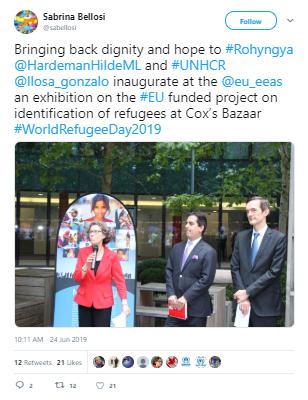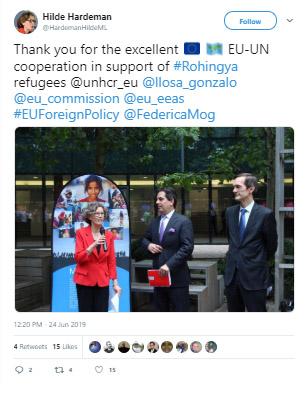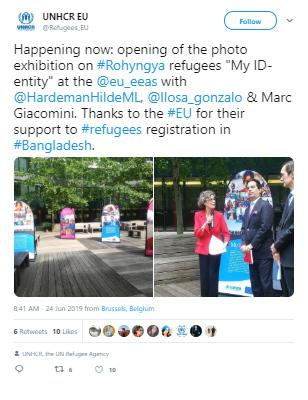
On the occasion of World Refugee Day on 20 June 2019, the EEAS and the European Commission’s Service for Foreign Policy Instruments hosted the photo exhibition "My ID-entity" illustrating how the EU and the UN Refugee Agency (UNHCR) support refugee registration in Bangladesh. The exhibition was symbolic for the joint endeavour by the EU and UNHCR to help and support Rohingya refugees and previously appeared on Place Flagey in Brussels, Belgium.
Hosting more than 900,000 Rohingya refugees from Myanmar, Cox’s Bazar in Bangladesh is the biggest refugee camp in the world. The UN Refugee Agency, together with its partners, responds to the urgent humanitarian needs in Cox’s Bazar, and provides protection, shelter, water, sanitation, and fuel. UNHCR and the Government of Bangladesh, with the support of the European Union’s Instrument contributing to Stability and Peace (IcSP), are also providing individual identity documents. For the first time ever, hundreds of thousands of Rohingya refugees now have official identity documents.
After the opening of the exhibition by Ms Hilde Hardeman, Head of Service and Director of the Service for Foreign Policy Instruments, Mr Gonzalo Vargas Llosa, Regional Representative for EU Affairs of the UN Refugees Agency and Marc Giacomini, Deputy Managing Director for Global and Multilateral issues of the European External Action Service, visitors could experience the registration and verification process themselves.

|

|

|
Background
Managed by the European Commission’s Service for Foreign Policy Instruments, the Instrument contributing to Stability and Peace (IcSP) provides short- and mid-term assistance on conflict prevention, crisis-response and peace-building actions around the world. There are currently around 200 projects in over 75 countries. These IcSP projects are implemented by Non-Governmental Organisations, the UN and other International Organisations, EU Member State agencies and regional and sub-regional organisations.
For more information
- The EU's Instrument contributing to Stability and Peace (IcSP)
- Delegation of the European Union to Bangladesh
| To establish unique individual identity data, all persons aged 5 years and above have their iris and fingerprints scanned. This biometric data collection requires just a computer and an iris scanner or fingerprint scanner. | The family is the core unit to provide protection and assistance. This family photo is stored together with the biometric data of all members of the family. Collecting a full biometric data set of an individual takes less than two minutes, verifying an identity less than five seconds | Identity management, through ten-digit fingerprints and iris scans, is crucial to get to know the population and their needs, and can be done in a variety of environments, both online and office | |
| Identity management, through ten-digit fingerprints and iris scans, is crucial to get to know the population and their needs, and can be done in a variety of environments, both online and office. | Through interviews, accurate and continuously updated individual and family information is collected and securely stored by UNHCR, as part of its responsibility to protect, assist and provide solutions for refugees. | The data of refugees is collected in a secure, accurate and comprehensive way, with progress (Profile Global Registration System), the UNHCR data management tool. UNHCR also makes the data available to other humanitarian partners, to avoid that refugees need to register multiple times with different agencies. The data is continuously updated and linked to other civil documentation, such as birth, death, marriage and divorce certifications. | |
| The data of refugees is collected in a secure, accurate and comprehensive way, with progress (Profile Global Registration System), the UNHCR data management tool. UNHCR also makes the data available to other humanitarian partners, to avoid that refugees need to register multiple times with different agencies. The data is continuously updated and linked to other civil documentation, such as birth, death, marriage and divorce certifications. | A refugee goes through the registration process at Kutupalong refugee camp in Cox’s Bazar, Bangladesh. | Nur, Subeda and Anarkoli at Kutupalong refugee camp in Cox’s Bazar, Bangladesh. | Children outside the family shelter in Kutupalong refugee Camp, Cox’s Bazar, Bangladesh. Over half of the Rohingya refugees in Bangladesh are children. In situations of crisis and displacement they are the first at risk of various forms of abuse, separation, neglect, violence and exploitation. |
| Young Rohingya refugees in Kutupalong refugee camp, Cox’s Bazar, Bangladesh. With the support of UNHCR, teenagers in Kutupalong refugee camp are conducting mental health workshops, in which children aged 10-16 are encouraged to talk about their feelings and learn psychosocial skills. | A Rohingya girl in the Camp 4 Extension, Kutupalong refugee camp, Cox’s Bazar, Bangladesh. Education is a critical element in any refugee response, as it protects but also empowers children. Worldwide 4 million refugee children are unable to attend school. | ||
Details
- Publication date
- 11 July 2019
- Author
- Service for Foreign Policy Instruments
